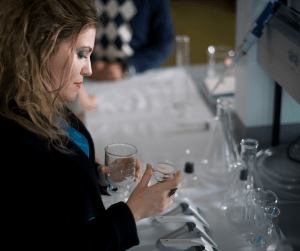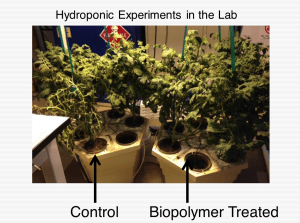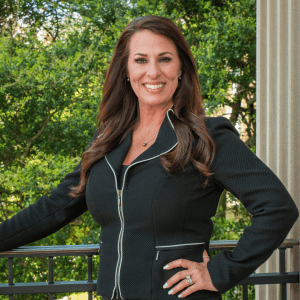Tynesia Boyea-Robinson is a Hunt Institute Fellow, the President and CEO of CapEQ, and an Executive Board Member for Big Thought. Boyea-Robinson exemplifies cross-sector leadership with extensive experience in consulting on impact investment. She has a desire to collaborate with Dr. Eva Csaky in mentoring students involved in research in the inclusive economy and can be seen working in the Institute readily available for our team.
In her book, Just Change: How To Collaborate For Lasting Impact, Tynesia shares her experience investing in cities and leaders across the country. The goal of Just Change is to help readers understand what’s working, what’s not working, and why in order to improve their own communities. Boyea-Robinson’s experience as an entrepreneur, Six Sigma blackbelt, and technologist uniquely positions her to catalyze a results-driven era of social change. In her previous role as Chief Impact Officer of Living Cities, she was responsible for ensuring $100M of investment produced outcomes that improved the lives of low-income people across the country.
In 2011, Boyea-Robinson founded Reliance Methods to help Fortune 500 clients like the Carlyle Group, Marriott, and others change the way the world does business. Tynesia has been religiously leading and writing about enterprises that “do well and do good” for over a decade. As President and CEO of Reliance Methods, she continues to demonstrate how business and community goals can powerfully align towards mutual outcomes.
Boyea-Robinson relies on her deep experience as a social change agent to advise clients. For example, she leveraged effective cross-sector partnerships to help establish the Social Innovation Fund and the Workforce Investment and Opportunity Act. Additionally, as founding Executive Director of Year Up National Capital Region (NCR) she raised $20M, was recognized by President Obama, and supported the organization to ensure thousands of low-income young adults are hired in careers with family sustaining wages.
When asked what motivates her in impact work she replied, “We need to reimagine what is possible for an economic system that helps everyone. Businesses and corporations can and should be a large part of this reimagining—obviously, they are the primary driver of capitalist values and decision making. Capitalism is just a tool to meet an end–we just have to use the tool in the right way.”
Earlier in her career, Boyea-Robinson was a leader within several business units at General Electric. From transforming the entire company to utilize technology for online sales to leading an international mortgage bank acquisition, her experience at GE groomed her to achieve outcomes regardless of industry.
Boyea-Robinson has been a featured speaker for a broad array of audiences including South by Southwest and the White House Council for Community Solutions. She has published several articles, which have been featured in the Washington Post, Forbes and in Leap of Reason: Managing to Outcomes in an Era of Scarcity. Her work was also highlighted in the New York Times bestseller A Year Up as well as in the Harvard Business School case study Year Up: A Social Entrepreneur Builds High Performance. She serves on numerous boards and committees.
Boyea-Robinson received her MBA from Harvard Business School and has a dual degree in Electrical Engineering and Computer Science from Duke University. She and her college sweetheart, Keith, are committed to indoctrinating their children, Dylan and Sydney, with, “… a love of Duke basketball and all things geeky and sci-fi.”
To read more about the Hunt Institute’s work to develop future-focused solutions to some of the world’s biggest problems, please click here. For the latest news on the Hunt Institute, follow our social media accounts on LinkedIn, Facebook, and Instagram. We invite you to listen to our Podcast called Sages & Seekers. If you are considering engaging with the institute, you can donate, or sign-up for our newsletter by emailing huntinstitute@smu.edu.











